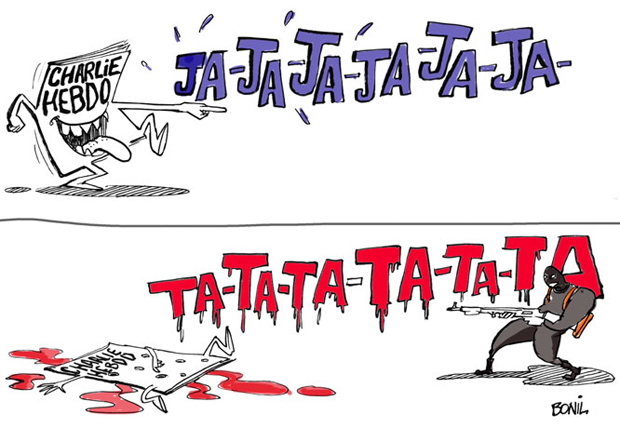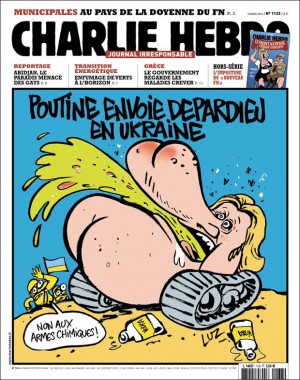Index relies entirely on the support of donors and readers to do its work.
Help us keep amplifying censored voices today.
[vc_row][vc_column][vc_single_image image=”114664″ img_size=”full” add_caption=”yes” alignment=”right”][vc_column_text]Frédéric Boisseau
Franck Brinsolaro
Jean Cabut
Elsa Cayat
Stéphane Charbonnier
Philippe Honoré
Bernard Maris
Ahmed Merabet
Mustapha Ourrad
Michel Renaud
Bernard Verlhac
Georges Wolinski
These people were brutally murdered on 7th January 2015. Their “crime” was to work for the French satirical publication Charlie Hebdo.
Whatever your views on the content of the magazine, on their cartoons, their editorial line and their publication of an image of the Prophet Mohammed, the reality is that these people were massacred because of a cartoon. They didn’t threaten anyone. They just went to work on a normal day and were never to return to their families.
This week a terror trial has commenced in France. Fourteen people are charged with being accomplices to the terrorists who murdered 12 people at the offices of Charlie Hebdo, injured a further 11 people and then two days later murdered four people at a Jewish supermarket.
These were acts of terror. Designed to silence and scare. They were attacks on free expression and on freedom of religious belief. They were a hate crime. And even worse they led to more hate, more fear and more abuse towards the French Muslim community.
Index won’t publish the names of the perpetrators. These people sought to divide their country. They sought to sow the seeds of hate and distrust. They are not worthy of our time or consideration.
Today we remember the victims, the survivors and their friends and families. There is nothing more to say.[/vc_column_text][/vc_column][/vc_row][vc_row][vc_column][/vc_column][/vc_row]
Members and supporters of the National Secular Society gathered in Portcullis House on Wednesday night to discuss the future of free speech, two years after the attack on Charlie Hebdo. Read the full article
[vc_row][vc_column][vc_column_text]
On 7 January 2015, two gunmen entered the Paris offices of Charlie Hebdo and murdered 12 people, including most of the senior editorial staff. The attack was in reprisal for the satirical magazine’s publishing of cartoons of the prophet Mohammed.
In defiance of this affront to free speech, the front cover of the “survivor’s edition” of Charlie Hebdo – which sold 3 million copies in 25 countries – depicted Mohammed crying and holding a Je Suis Charlie placard with the headline: Tout est pardonné (All is forgiven).
Two years on from the attack, we have compiled a reading list of articles published by Index on Censorship about Charlie Hebdo, including not just the 2015 attack but the 2011 firebombing of the publication’s previous office on the day a “sharia” edition was to hit news stands.[/vc_column_text][/vc_column][/vc_row][vc_row][vc_column width=”1/4″][vc_single_image image=”28598″][/vc_column][vc_column width=”3/4″][vc_column_text]
On the anniversary of the brutal attack on the offices of Charlie Hebdo Index joined others in reaffirming our commitment to the defence of the right to freedom of expression.
[/vc_column_text][/vc_column][/vc_row][vc_row][vc_column width=”1/4″][vc_single_image image=”63894″][/vc_column][vc_column width=”3/4″][vc_column_text]
Threats against freedom of expression come in all shapes and sizes. We need to stand up to the bullies together.
[/vc_column_text][/vc_column][/vc_row][vc_row][vc_column width=”1/4″][vc_single_image image=”62817″][/vc_column][vc_column width=”3/4″][vc_column_text]
Index on Censorship condemnsed this appalling attack on the satirical magazine Charlie Hebdo, and any attempt to silence a free press.
[/vc_column_text][/vc_column][/vc_row][vc_row][vc_column width=”1/4″][vc_single_image image=”62956″][/vc_column][vc_column width=”3/4″][vc_column_text]
People around the world show solidarity with the French satirical magazine.
[/vc_column_text][/vc_column][/vc_row][vc_row][vc_column width=”1/4″][vc_single_image image=”66140″][/vc_column][vc_column width=”3/4″][vc_column_text]
Index on Censorship, the Comic Book Legal Defense Fund, freeDimensional, Pen America, FreeWord, Reporters Without Borders, Article 19 and English PEN called on all those who believe in the fundamental right to freedom of expression to join in publishing the cartoons or covers of Charlie Hebdo on 8 January 2015. We believe that only through solidarity – in showing that we truly defend all those who exercise their right to speak freely – can we defeat those who would use violence to silence free speech.
[/vc_column_text][/vc_column][/vc_row][vc_row][vc_column width=”1/4″][vc_single_image image=”62867″][/vc_column][vc_column width=”3/4″][vc_column_text]
You can’t kill an idea by killing people. The sickening attack on Charlie Hebdo has shown that to be true. As France mourns her dead, millions around the world are discovering the work of her bravest satirists. Nous sommes Charlie.
[/vc_column_text][/vc_column][/vc_row][vc_row][vc_column width=”1/4″][vc_single_image image=”63040″][/vc_column][vc_column width=”3/4″][vc_column_text]
Playwright and poet Meltem Arikan penned a poem reflecting on the Charlie Hebdo attack. How can thoughts be free?
[/vc_column_text][/vc_column][/vc_row][vc_row][vc_column width=”1/4″][vc_single_image image=”62991″][/vc_column][vc_column width=”3/4″][vc_column_text]
Cartoonists were among the most visual in their reaction to the attack on French satirical magazine Charlie Hebdo. Musa Kart and Xavier Bonilla, who have both been targeted by their governments, shared their thoughts.
[/vc_column_text][/vc_column][/vc_row][vc_row][vc_column width=”1/4″][vc_single_image image=”63036″][/vc_column][vc_column width=”3/4″][vc_column_text]
The decision by six authors to withdraw from a Pen American Centre gala in which Charlie Hebdo was honoured with an award once again emphasised the dangerous notion that some forms of free expression are more worthy than others.
[/vc_column_text][/vc_column][/vc_row][vc_row][vc_column width=”1/4″][vc_single_image image=”83459″][/vc_column][vc_column width=”3/4″][vc_column_text]
When the Charlie Hebdo killings happened in Paris in early 2015, attention swivelled to the way that terror and accusation are being used to try and stifle debate. But these are discussions that are not only being held in France, so I asked writers around the world to write short essays exploring the ways that journalists and artists have been threatened over the years, for exploring themes that others would rather they had not tackled.
[/vc_column_text][/vc_column][/vc_row][vc_row][vc_column width=”1/4″][vc_single_image image=”28286″][/vc_column][vc_column width=”3/4″][vc_column_text]
The office of French satirical Magazine Charlie Hebdo was firebombed as a result of its decision to publish a front cover satirising Mohammed. Here, Sara Yasin and Myriam Francois-Cerrah discuss the background and motivations behind the attack, and ask why some Muslims feel entitled to answer offence with violence.
[/vc_column_text][/vc_column][/vc_row][vc_row][vc_column width=”1/4″][vc_single_image image=”28597″][/vc_column][vc_column width=”3/4″][vc_column_text]
The smoke had barely cleared from the burned-out office of Charlie Hebdo magazine back in 2011 when Time magazine’s Bruce Crumley chose to criticise the satirists over the terrorists. James Kirchick denounces this all-too-familiar tendency.
[/vc_column_text][/vc_column][/vc_row][vc_row][vc_column width=”1/4″][vc_single_image image=”71736″][/vc_column][vc_column width=”3/4″][vc_column_text]
In the months following the 2015 attack on Charlie Hebdo, a graphic novel exploring challenges to press freedom across Europe and the impact of limitations on journalists was released by the European Youth Press.
[/vc_column_text][/vc_column][/vc_row]

On the anniversary of the brutal attack on the offices of Charlie Hebdo we, the undersigned, reaffirm our commitment to the defence of the right to freedom of expression, even when that right is being used to express views that some may consider offensive.
The Charlie Hebdo attack, which left 11 dead and 12 wounded, was a horrific reminder of the violence to which journalists, artists and other critical voices are subjected in a global atmosphere marked by increasing intolerance of dissent. The killings inaugurated a year that has proved especially challenging for proponents of freedom of opinion.
Non-state actors perpetrated violence against their critics largely with impunity, including the brutal murders of four secular bloggers in Bangladesh by Islamist extremists, and the killing of an academic, M M Kalburgi, who wrote critically against Hindu fundamentalism in India.
Despite the turnout of world leaders on the streets of Paris in an unprecedented display of solidarity with free expression following the Charlie Hebdo murders, artists and writers faced intense repression from governments throughout the year. In Malaysia, cartoonist Zunar is facing a possible 43-year prison sentence for alleged ‘sedition’; in Iran, cartoonist Atena Fardaghani is serving a 12-year sentence for a political cartoon; and in Saudi Arabia, Palestinian poet Ashraf Fayadh was sentenced to death for the views he expressed in his poetry.
Perhaps the most far-reaching threats to freedom of expression in 2015 came from governments ostensibly motivated by security concerns. Following the attack on Charlie Hebdo, 11 interior ministers from European Union countries including France, Britain and Germany issued a statement in which they called on Internet service providers to identify and remove online content ‘that aims to incite hatred and terror.’ In July, the French Senate passed a controversial law giving sweeping new powers to the intelligence agencies to spy on citizens, which the UN Human Rights Committee categorised as “excessively broad”.
This kind of governmental response is chilling because a particularly insidious threat to our right to free expression is self-censorship. In order to fully exercise the right to freedom of expression, individuals must be able to communicate without fear of intrusion by the State. Under international law, the right to freedom of expression also protects speech that some may find shocking, offensive or disturbing. Importantly, the right to freedom of expression means that those who feel offended also have the right to challenge others through free debate and open discussion, or through peaceful protest.
On the anniversary of the Charlie Hebdo attacks, we, the undersigned, call on all Governments to:
PEN International
ActiveWatch – Media Monitoring Agency
Adil Soz – International Foundation for Protection of Freedom of Speech
Africa Freedom of Information Centre
ARTICLE 19
Bahrain Center for Human Rights
Belarusian Association of Journalists
Brazilian Association for Investigative Journalism
Bytes for All
Cambodian Center for Human Rights
Canadian Journalists for Free Expression
Center for Independent Journalism – Romania
Center for Media Freedom and Responsibility
Comité por la Libre Expresión – C-Libre
Committee to Protect Journalists
Electronic Frontier Foundation
Foundation for Press Freedom – FLIP
Freedom Forum
Fundamedios – Andean Foundation for Media Observation and Study
Globe International Center
Independent Journalism Center – Moldova
Index on Censorship
Initiative for Freedom of Expression – Turkey
Institute for the Studies on Free Flow of Information
Instituto de Prensa y Libertad de Expresión – IPLEX
Instituto Prensa y Sociedad de Venezuela
International Federation of Journalists
International Federation of Library Associations and Institutions
International Press Institute
International Publishers Association
Journaliste en danger
Maharat Foundation
MARCH
Media, Entertainment and Arts Alliance
Media Foundation for West Africa
National Union of Somali Journalists
Observatorio Latinoamericano para la Libertad de Expresión – OLA
Pacific Islands News Association
Palestinian Center for Development and Media Freedoms – MADA
PEN American Center
PEN Canada
Reporters Without Borders
South East European Network for Professionalization of Media
Vigilance pour la Démocratie et l’État Civique
World Association of Community Radio Broadcasters – AMARC
PEN Mali
PEN Kenya
PEN Nigeria
PEN South Africa
PEN Eritrea in Exile
PEN Zambia
PEN Afrikaans
PEN Ethiopia
PEN Lebanon
Palestinian PEN
Turkish PEN
PEN Quebec
PEN Colombia
PEN Peru
PEN Bolivia
PEN San Miguel
PEN USA
English PEN
Icelandic PEN
PEN Norway
Portuguese PEN
PEN Bosnia
PEN Croatia
Danish PEN
PEN Netherlands
German PEN
Finnish PEN
Wales PEN Cymru
Slovenian PEN
PEN Suisse Romand
Flanders PEN
PEN Trieste
Russian PEN
PEN Japan